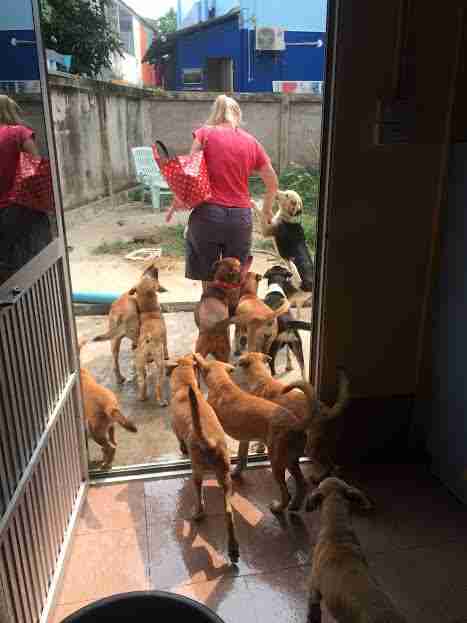It all started with Bella, a tiny, 4-week-old puppy hanging around a roadside temple in Songkhla, Thailand.
Tamara Johnston, an Australian woman living in the area, noticed Bella and knew she had to help her — Bella didn’t seem to have a mom or anyone else taking care of her.

“She would likely have been killed by a car had she stayed there,” Johnston told The Dodo. “If not killed by a car, she would have soon been sick due to disease such as parvo, distemper, blood parasites or mange — this is very common here.”
Johnston scooped Bella up and took her home with her, and ended up adopting Bella as her own.

But after Bella, Johnston started seeing lots of dogs who needed help in Thailand — starving dogs, diseased dogs, neglected dogs. Everywhere she looked, she saw another one who needed her help.
“In Western countries, we have shelters, pounds and various rescue centers that dogs can be surrendered to,” Johnston said. “Here they are very few and far between.”

There was a local government-run dog shelter in Songkhla, but when Johnston visited she was horrified at what she saw.
“There is no funding for the shelter and dogs are dying at a fast rate … ill with blood parasites from ticks and fleas,” Johnston said.

Johnston, who was working in Thailand as an English teacher, started taking dogs into her home and giving them food, a safe place to sleep and proper veterinary care. She also tried to find homes for as many rescue dogs as she could, and many of her dogs have ended up being adopted by families in the U.S.
When she saw street dogs she couldn’t take home, she at least made sure they got food and any necessary vet care.

But the problem was overwhelming. While there are some great animal rescue groups in Thailand, as well as caring individuals, there weren’t any large organizations helping dogs in Songkhla, according to Johnston. So she did as much as she could herself.
When people caught wind of the fact that she was rescuing dogs, people started dumping puppies at Johnston’s house.

“People here often take pictures of me and laugh, instead of offering a helping hand,” Johnston said. “Vets are not always the most helpful or responsible. People will ask for my help without offering any. So, on top of my actual job of rescuing and treating, I also have to deal with so many outside obstacles that just make my job even more difficult. But I’m determined and will never give up on these dogs or any other animal that needs my help.”

At the moment, Johnston is currently caring for 38 foster dogs in her own home, and she also cares for about 50 street dogs.
After spending six years rescuing dogs on a case-by-case basis, Johnston decided to officially start a rescue group called Thai Street Paws. Johnston hopes to someday build a clinic where she can offer sterilizations and other basic veterinary services.

“I know I can’t save every single dog, but I want to help as many as I can,” Johnston said. “That is the reason I continue to stay here. I want to make a difference.”